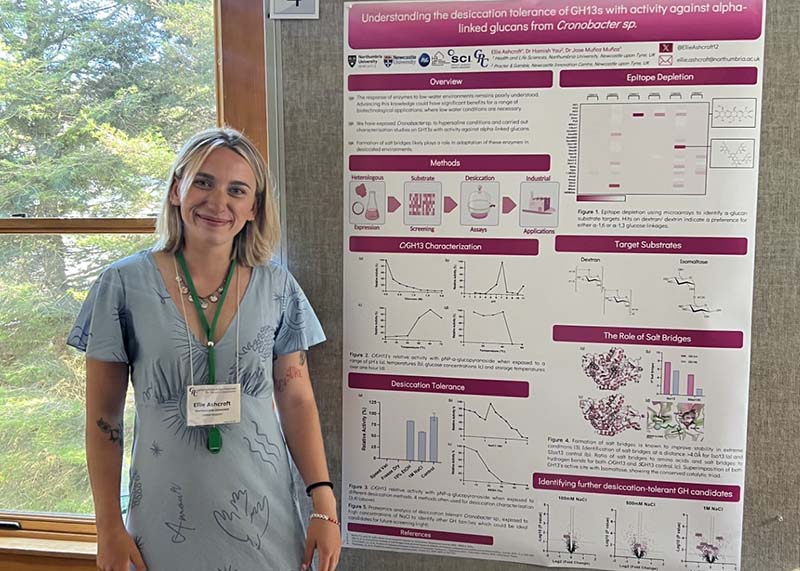Ellie Ashcroft was awarded a Rideal Travel Bursary to attend the Gordon Research Conference (GRC) on Carbohydrate-active Enzymes (CAZymes) for Glycan Conversion in New Hampshire, USA, in July 2025. Here she tells us about her highlights from the conference. Read her report below.
"The Gordon Research Conference (GRC) on Carbohydrate-active Enzymes (CAZymes) for Glycan Conversion took place at Procter Academy, New Hampshire, USA, in late July 2025. The meeting explored cutting-edge themes including renewable fuels, health, and biochemical production, with a strong emphasis on Cryo-EM, genomics, chemical biology, and enzyme biochemistry. I had the opportunity to present a poster on my current PhD research within the enzyme biochemistry theme, and to engage with leading experts and early-career researchers working across related areas. This report reflects on my experience and the professional insights I gained during the event.
"This GRC is arguably the most relevant international forum for research directly aligned with my PhD and our lab's broader objectives. I found several sessions particularly valuable - notably those focused on synthetic gene libraries for enzyme screening and advances in functional metagenomics. A keynote lecture by Prof. Sarel Fleishman introduced a compelling strategy for identifying enzyme candidates with improved stability under extreme conditions, such as high salinity and low water activity - two critical parameters for my research. Another highlight was Prof. Marco Moracci’s presentation on metagenomic exploration of extremophiles. His approach to mining novel biocatalysts sparked a promising discussion between our lab groups, potentially paving the way for a future collaboration focused on the discovery and characterisation of novel extremozymes.
"One of the strengths of the GRC format is its scale, it is intimate enough to foster meaningful conversations, yet broad enough to represent diverse scientific themes. The welcoming and collegial atmosphere encouraged spontaneous discussions, idea exchange, and potential collaborations. With poster sessions rotating daily, I had the chance to engage with a wide range of work and to receive insightful feedback on my own research, particularly from fellow early-career scientists. The international scope of the conference also brought together a diverse research community, offering valuable perspectives and opening doors to global collaboration. An additional benefit of working in this field is also the diverse range of chemists, biologists and biochemists. This can be very beneficial for me studying CAZymes from a biology perspective when I have the opportunity to interact with chemists who can offer their expertise in difficult and expensive substrate synthesis and understanding of complex catalytic mechanism.
"This years GRC stands out for the new format of less talks per session to ensure time for questions and inclusive scientific discussion, both within the lecture hall and in the breaks. Additionally, the Gordon Research Seminar (GRS), a meeting held prior to the GRC for early-career researchers only, had a unique programme focused on PhD project presentations but also some key messages about career development in academia. These general discussions enabled everyone to share their own experiences on publication successes and challenges and how some post-doctoral researchers are carving their own career in the CAZyme field following their PhD success. They also included a talk from Prof. Stephen Withers who gave some insightful advice on how to find your niche in the field and tips and tricks on creating a productive and successful lab group of your own. This format was a new experience for me but was extremely refreshing and motivating in terms of developing my own career.
"I would like to extend my sincere gratitude to the Society of Chemical Industry (SCI) and the Royal Society of Chemistry (RSC) for awarding me the Rideal Travel Bursary offered by the Sir Eric Rideal Trust, which enabled my attendance at the GRC Conference on Carbohydrate-active Enzymes. Without this support, it would not have been possible for me to travel to New Hampshire and participate in such a focused and internationally respected event. The bursary helped cover key travel and accommodation costs, allowing me to fully engage with the scientific programme, present my PhD research, and build meaningful connections with researchers from around the world. I’m especially thankful for SCI’s continued commitment to supporting early-career scientists - opportunities like this play a crucial role in professional development and the advancement of collaborative research."
Ellie Ashcroft
PhD student
Northumbria University


